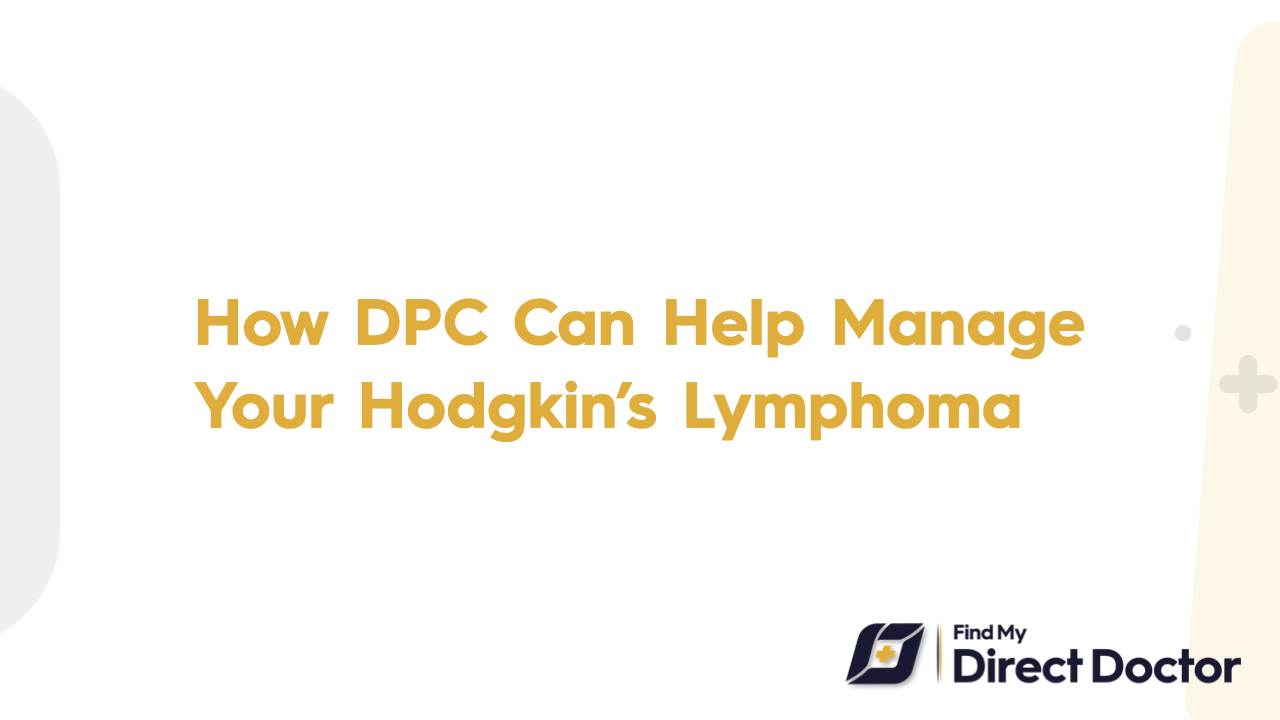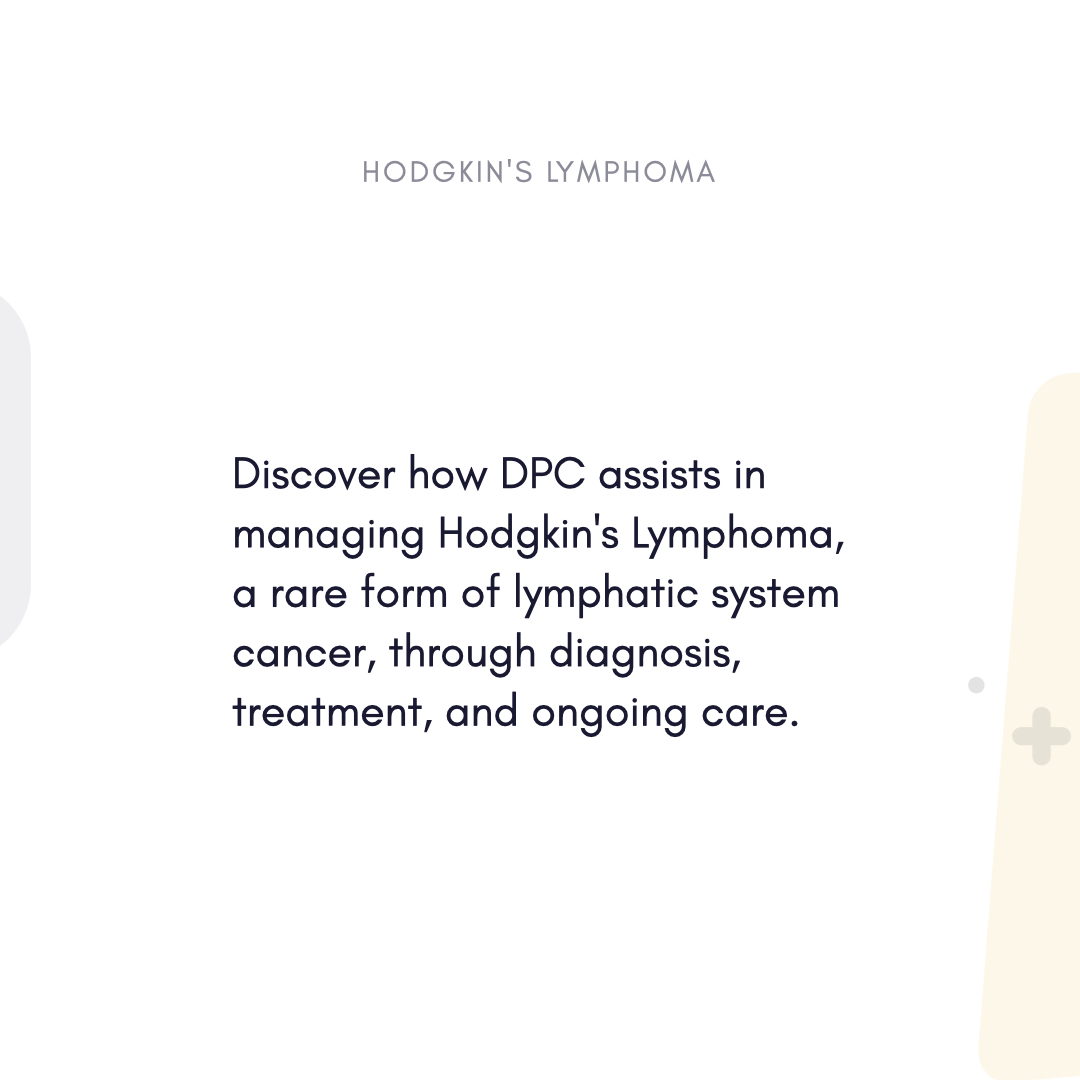Hodgkin’s Lymphoma and Direct Primary Care (DPC): Your Path to Personalized, Comprehensive Care
Though modern treatments give cure rates exceeding 90% for early-stage patients, a Hodgkin's lymphoma (HL) diagnosis can feel overwhelming. Reed-Sternberg cells define HL, which falls into classical Hodgkin's lymphoma (nodular sclerosis, mixed cellularity, lymphocyte depletion, lymphocyte-rich) and nodular lymphocyte-predominant HL. Usually, treatment consists in radiation in addition to chemotherapy (e.g., ABVD: doxorubicin, bleomycin, vinblastine, dacarbazine). Still, surviving HL calls for careful follow-up, side-effect control, and emotional support—more than just chemo. Offering reasonably priced, patient-centered care that complements oncology treatment and empowers long-term wellness, Direct Primary Care (DPC) closes this gap.

Knowing B-cell Lymphoid Malignancy: Hodgkin's Lymphoma
HL targets the lymphatic system. Although very treatable, issues include:
- Side effects of the treatment: Exhaustion, neuropathy, infections, infertility, or organ damage—cardiotoxicity from doxorubicin, for example.
- Long-term hazards include thyroid dysfunction, heart disease, breast, lung, or secondary cancers.
- Emotional toll: PTSD from diagnosis and treatment, anxiety, or depression.
- Coordinating gaps: Miscommunication among specialists, primary care, and oncologists.
Maximizing survivors and outcomes depends on early diagnosis and multidisciplinary treatment.
DPC Transforms: Hodgkin's Lymphoma Treatment
Under the membership approach known as Direct Primary Care (DPC), patients pay a monthly fee—usually USD 50–USD 150—for unlimited access to their doctor. This means for HL patients no hurried visits, no surprise bills, and flawless coordination between your cancer team and primary care.
Individualized Attendance Anchored in Experience
Using National Comprehensive Cancer Network (NCCN) recommendations, DPC physicians provide:
- Coordinate treatment: Managing side effects (e.g., anti-nausea medications, neutropenia prevention) by working with oncologists.
- Following NCCN-recommended follow-ups will help to:
- Screening: Thyroid panels, lung function tests, echocardiograms, or annual cardiac imaging.
- Preventive care includes lifestyle choices to rebuild immunity and vaccinations (such as pneumococcal, HPV).
- Mental health integration: Using therapy or support groups, address "chemo brain," anxiety, or depression.
Reasonably Priced, Clear Treatment
Using wholesale-priced drugs, DPC clinics help to lower financial burden:
- Discounted antiemetics, growth hormones, or painkillers.
- Discounted labs at transparent rates include CBCs, metabolic panels, or infection tests.
- By means of proactive symptom control, avoid ER visits for febrile neutropenia.
Ongoing Support for Every Stage
Having 24/7 access to your doctor allows you to:
- Change how you handle chemo cycle symptoms.
- Record recovery benchmarks in shared health notebooks.
- Use palliative care tools for fatigue or pain.
Customized HL Management in DPC
The patient-centered approach of DPC fits your particular path in line with NCCN survivorship recommendations:
- Side effects management in precision: Genetic testing—e.g., CYP2D6 for neuropathy risk—to customize chemo dosage.
- Integrating acupuncture, meditation, or physical therapy, holistic healing seeks to restore quality of life.
- Routine breast MRIs or lung tests for those who have been radiation-exposed help to prevent secondary cancer.
Real-Life Success Stories
- Case 1: During ABVD treatment, Sarah, 32, was quite tired. Her DPC doctor paired her with a therapist, prescribed iron infusions for anemia, and worked with her oncologist to change the timing of the chemotherapy. Sarah finished treatment with the vitality needed to take care of her child.
- Case 2: James, 45, developed hypothyroidism five years after his remission. Early on through routine screening, his DPC doctor discovered it, began levothyroxine, and linked him to a cardiologist to track radiation-induced heart risks. James is active and cancer-free today.
Frequently Asked Questions: DPC and Hodgkin's Lymphoma
- Q: Can DPC take over from my oncologist?
A: No; DPC addresses side effects, survivability, and prevention to enhance oncology treatment. Your cancer team reports to your DPC doctor.
- Q: Is DPC reasonably priced for pricey cancer treatment?
A: Surely! Most patients cut on labs, drugs, and urgent care. Memberships run less than most cable bills.
- Q: Should a specialist be needed, what then?
A: Often securing cash-pay discounts, your DPC physician arranges referrals to oncologists, cardiologists, or mental health professionals.
Why DPC Wins for Hodgkin's Lymphoma Patients
DPC tackles directly the shortcomings in conventional HL treatment:
- Accessibility: Same-day chemo visits for symptom flares or bacterial infections.
- Focus survivorship: Using NCCN-recommended screenings for heart disease and secondary cancers.
- Cost transparency: Eliminating out-of-pocket expenses for needs related to ongoing post-treatment.
- Making sure oncologists, primary care doctors, and rehabilitation teams coordinate.
Take Charge of Your Hodgkin's Path Today
Though you don't have to fight Hodgkin's lymphoma by yourself, it is a fight. DPC provides a partner who helps you survive and flourish by combining modern support with relentless compassion.






